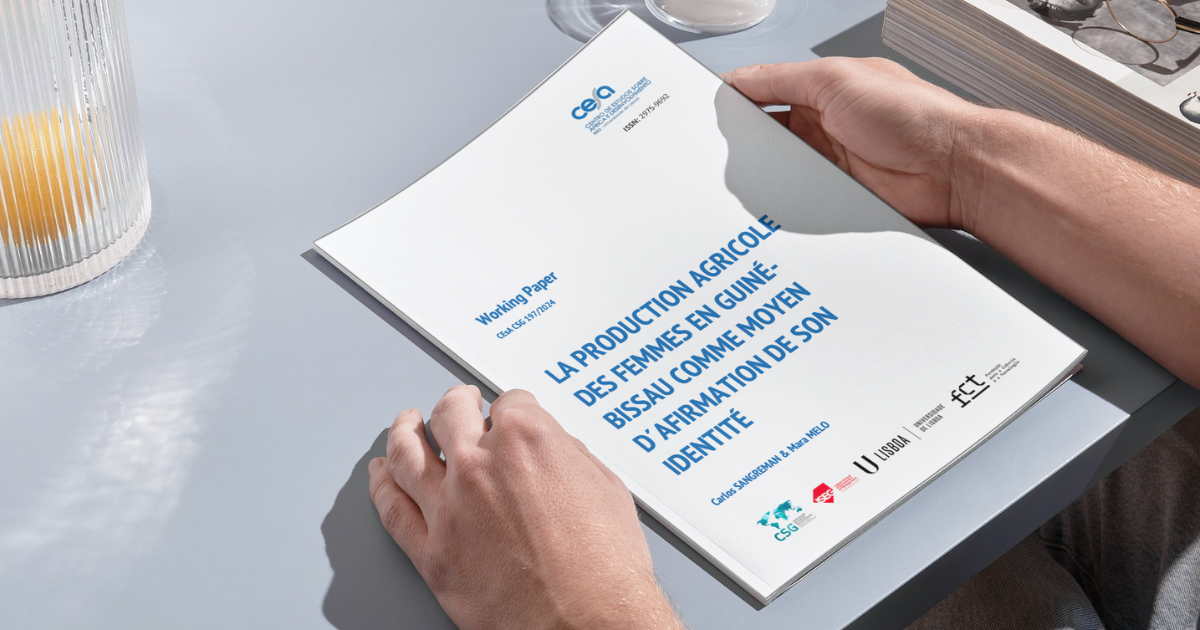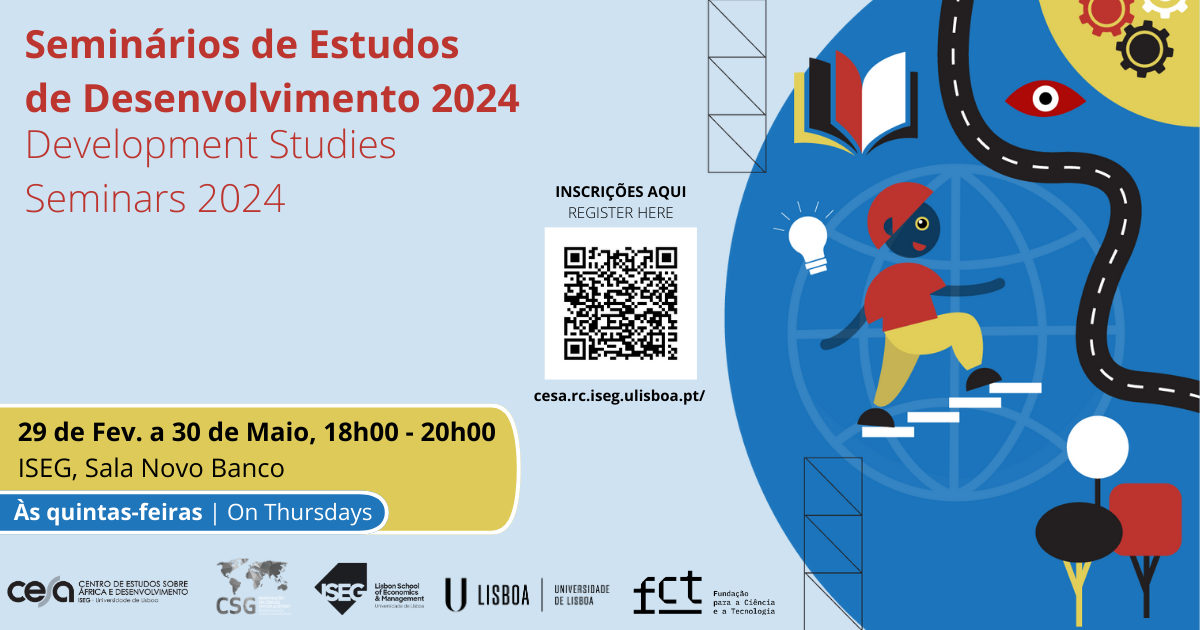CESA
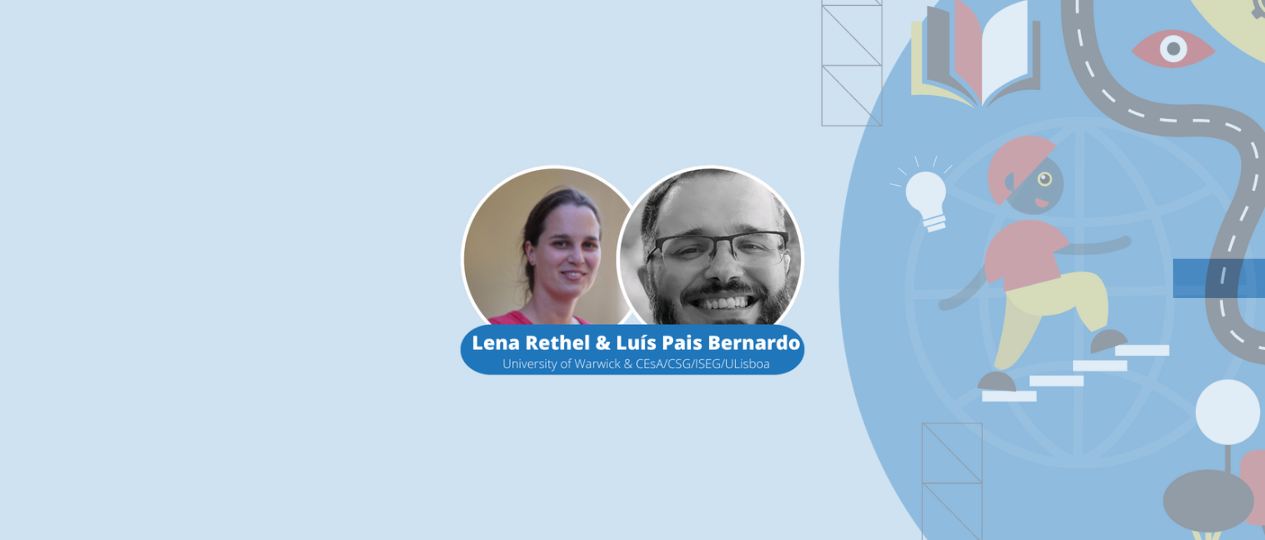
Development Studies Seminars 2024 | Capital Markets by Design? The rise of financial development planning in Southeast Asia
The seminars are an initiative that, since 1991, promotes research carried out in the areas of study of MDCI/ISEG/ULisboa and PDED/ISEG/ULisboa.

Development Studies Seminars 2024
Topic: “Capital Markets by Design? The rise of financial development planning in Southeast Asia”
Presenters: Lena Rethel & Luís Pais Bernardo (University of Warwick & CEsA/CSG/ISEG/ULisboa)
Date: March 14, 2024 (Thursday)
Hour: 6 pm to 8 pm (GMT/Lisbon)
Venue: Novo Banco Room, ISEG (Quelhas, Rua do Quelhas 6, 1200-781, Lisbon, Portugal)
Free admission, in person event. We recommend prior registration on EventBrite, but the capacity of the room will be filled in order of arrival.
This event is public and will be recorded and photographed for publication on CEsA’s communication channels. If you do not wish to have your image photographed and/or recorded, please notify the event organizers in advance via email: comunicacao@cesa.iseg.ulisboa.pt
More information and programme: https://cesa.rc.iseg.ulisboa.pt/news/development-studies-seminars-will-kick-off-on-february-29-at-iseg-with-a-series-of-10-sessions-of-presentations-by-guest-researchers/
Author: CEsA Communication (comunicacao@cesa.iseg.ulisboa.pt)
Images: CEsA/Reproduction

Working Paper CEsA no. 198/2024 sheds light on the concept of cumulative causation and its relevance for explaining economic growth trajectories in Sub-Saharan Africa

CEsA has published the Working Paper no 198/2024, entitled “The Relevance of the Concept of Cumulative Causation: Understanding growth trajectories in Sub-Saharan Africa”, in English, authored by Alice Nicole Sindzingre. Professor Sindzingre is a CEsA researcher, Research Associate at the CEPN (Paris-North Economics Centre, University Paris-North, France), and at the LAM Research Centre (‘Africas in the World’, National Centre for Scientific Research/CNRS-SciencesPo-Bordeaux, France).
This Working Paper sheds light on the concept of cumulative causation and its relevance for explaining economic growth trajectories in Sub-Saharan Africa. Firstly, it empirically discusses the possibility of divergence between regions and countries, as well as the related theoretical debates. Secondly, it questions the mainstream explanations of growth trajectories: notably the limitations stemming from the pre-eminence of the conceptual framework of equilibrium, as well as the limitations of modelling in the apprehending of causation and consideration of other social sciences. Then it presents the concept of cumulative causation. Finally, it shows the relevance of this concept for the explanation of growth trajectories via the stylised examples of Sub-Saharan Africa vs. East Asian economies.
Click here to access the Working Paper no 198/2024.
Abstract:
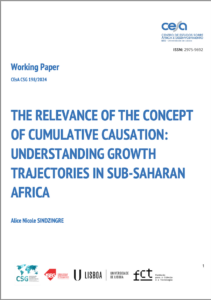 Differences in growth trajectories among countries – including the possibility of divergence –, are a central issue in economics. Mainstream economics explain growth processes via varieties of neoclassical models, even improved with concepts such as institutions. Yet such models have difficulties in providing accurate accounts of the growth trajectories of many developing countries, notably low-income ones. It is argued that the growth paths of low-income countries are more appropriately explained by the theoretical framework that relies on the nexus of concepts of cumulative causation, non-linearities, threshold effects, self-reinforcing processes, irreversibility, path dependence and traps – though this approach remains marginal in mainstream economic analyses of growth and development. Firstly, this nexus of concepts is a powerful framework concerning the possibility and explanation of dynamic divergence regarding growth between countries, as it exhibits properties such as: the possibility of cumulative, dynamically self-reinforcing, processes; the existence of thresholds and tipping points; multiple equilibria. Secondly, cumulative causation, by definition, involves a combination of causes: its conceptual framework allows for the integration of several dimensions – economic, political, social, cognitive –, whose combination results in either virtuous or vicious circles. In developing countries, these causes (and their coalescence) typically consist in economic structures (e.g., commodity-based export markets), political institutions and social norms (predatory regimes, high inequality) as well as types of public policies.
Differences in growth trajectories among countries – including the possibility of divergence –, are a central issue in economics. Mainstream economics explain growth processes via varieties of neoclassical models, even improved with concepts such as institutions. Yet such models have difficulties in providing accurate accounts of the growth trajectories of many developing countries, notably low-income ones. It is argued that the growth paths of low-income countries are more appropriately explained by the theoretical framework that relies on the nexus of concepts of cumulative causation, non-linearities, threshold effects, self-reinforcing processes, irreversibility, path dependence and traps – though this approach remains marginal in mainstream economic analyses of growth and development. Firstly, this nexus of concepts is a powerful framework concerning the possibility and explanation of dynamic divergence regarding growth between countries, as it exhibits properties such as: the possibility of cumulative, dynamically self-reinforcing, processes; the existence of thresholds and tipping points; multiple equilibria. Secondly, cumulative causation, by definition, involves a combination of causes: its conceptual framework allows for the integration of several dimensions – economic, political, social, cognitive –, whose combination results in either virtuous or vicious circles. In developing countries, these causes (and their coalescence) typically consist in economic structures (e.g., commodity-based export markets), political institutions and social norms (predatory regimes, high inequality) as well as types of public policies.
About the author:

Alice Nicole Sindzingre is reseacher at CEsA, and Research Associate at the CEPN (Paris-North Economics Centre, University Paris-North, France), and at the LAM Research Centre (‘Africas in the World’, National Centre for Scientific Research/CNRS-SciencesPo-Bordeaux, France). She taught in 2008-2010 at SciencesPo-Paris and in 2010-2014 in the department of economics of the University Paris-Nanterre. In 2005-2008, she wrote the monthly column on the theories of economic development in the French newspaper Le Monde. She has been a member of the Core Team of the World Bank World Development Report 2000-1 on poverty. She has conducted research on development economics and political economy as well as fieldwork in Sub-Saharan Africa (mainly in West Africa). She has published a great number of articles in academic journals and edited books on a large range of topics, including international trade, regional integration, foreign aid, China-Africa relationships, poverty traps, the theory of institutions, and the epistemology of economics.
Click here and get to know all the Working Paper Collection of CEsA
Author: CEsA Communications (comunicacao@cesa.iseg.ulisboa.pt)
Images: CEsA/Reproduction
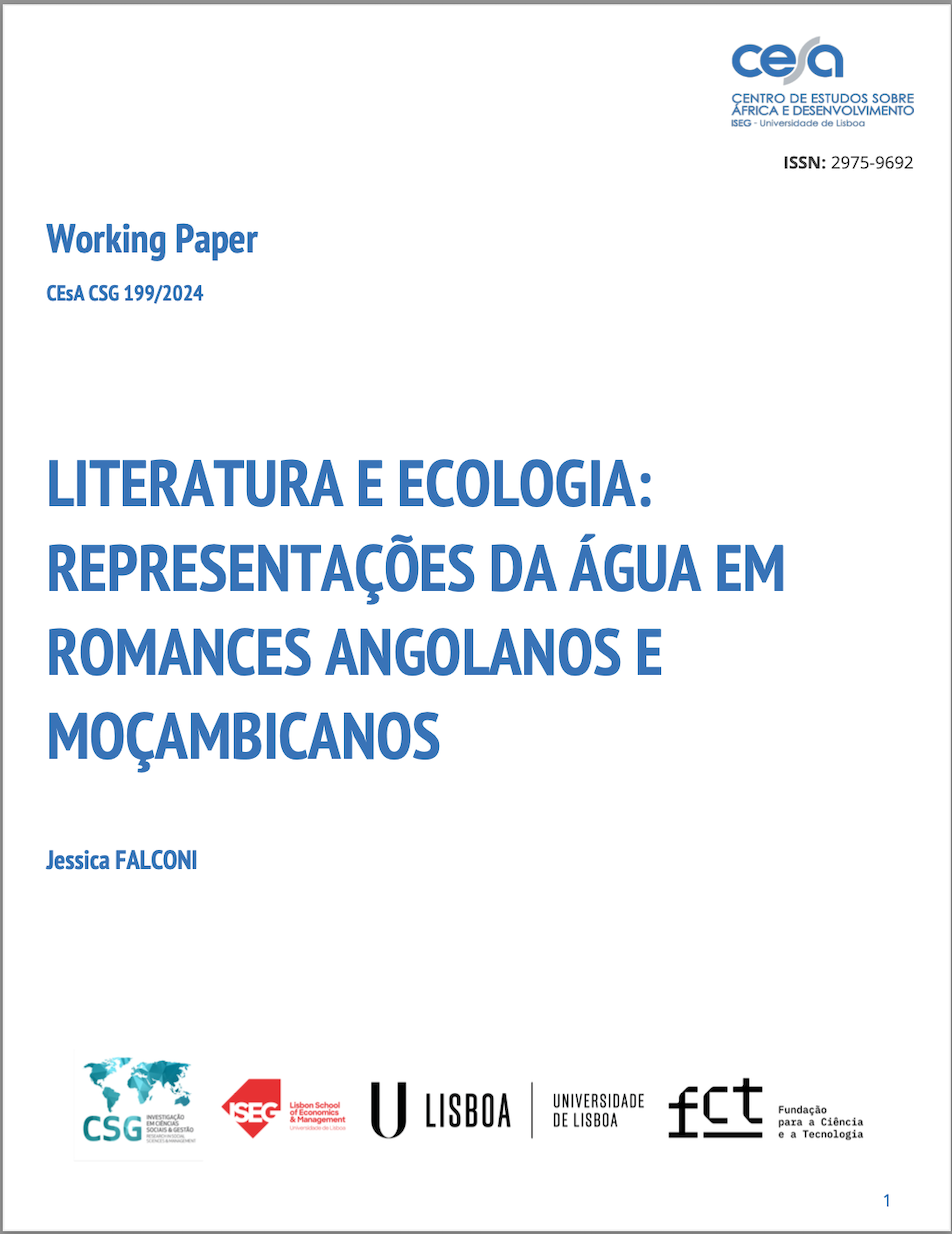
Working Paper 199/2024: Literatura e Ecologia: Representações da água em romances angolanos e moçambicanos
Abstract:
This article offers a brief cartography of the narrative role of water in Angolan and Mozambican literature, through a comparative reading of four novels: O desejo de Kianda (1995) by the Angolan Pepetela; De Rios Velhos e Guerrilheiros. I. O Livro dos Rios (2006) by Luandino Vieira; Água. Uma novela rural (2016) and Ponta Gea (2017) both by the Mozambican João Paulo Borges Coelho.
The introduction places the proposed cartography within the framework of ecocritical studies, whose various paradigms offer useful tools and concepts for reading the selected literary works. The thematic and comparative methodological approach highlights experiences and imaginaries common to two post-colonial contexts, despite the difference in scenarios, themes, aesthetic choices and narrative strategies. The analysis aims to demonstrate that water is a crucial element in narrating post-colonial Angolan and Mozambican societies.
Cite this Working Paper:
Falconi, Jessica (2024). “Literatura e Ecologia: Representações da água em romances angolanos e moçambicanos”. CEsA/CGS – Documentos de trabalho nº 199/2024
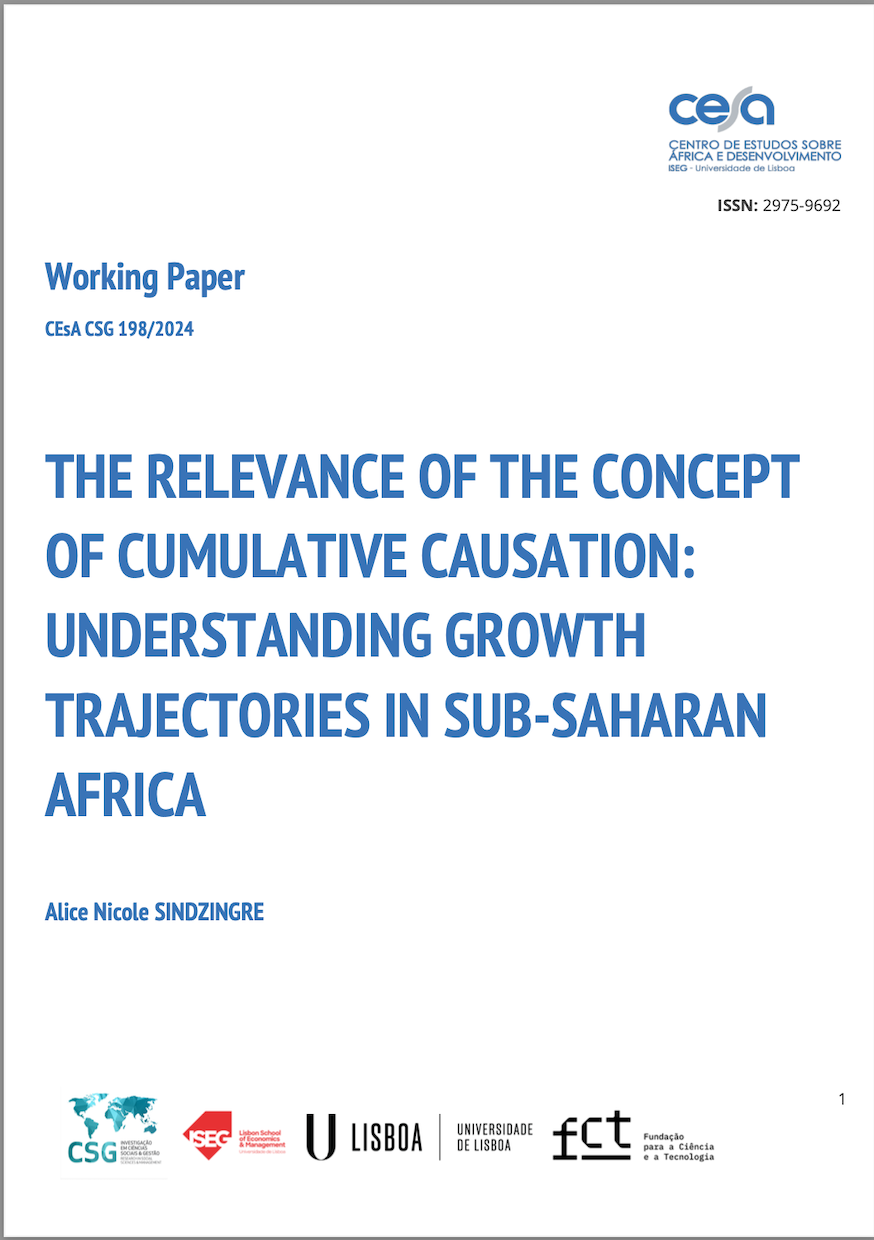
Working Paper 198/2024: The Relevance of the Concept of Cumulative Causation: Understanding growth trajectories in Sub-Saharan Africa
Abstract:
Differences in growth trajectories among countries – including the possibility of divergence -, are a central issue in economics. Mainstream economics explain growth processes via varieties of neoclassical models, even improved with concepts such as institutions. Yet such models have difficulties in providing accurate accounts of the growth trajectories of many developing countries, notably low-income ones. It is argued that the growth paths of low-income countries are more appropriately explained by the theoretical framework that relies on the nexus of concepts of cumulative causation, non-linearities, threshold effects, self-reinforcing processes, irreversibility, path dependence and traps – though this approach remains marginal in mainstream economic analyses of growth and development. Firstly, this nexus of concepts is a powerful framework concerning the possibility and explanation of dynamic divergence regarding growth between countries, as it exhibits properties such as: the possibility of cumulative, dynamically self-reinforcing, processes; the existence of thresholds and tipping points; multiple equilibria. Secondly, cumulative causation, by definition, involves a combination of causes: its conceptual framework allows for the integration of several dimensions – economic, political, social, cognitive -, whose combination results in either virtuous or vicious circles. In developing countries, these causes (and their coalescence) typically consist in economic structures (e.g., commodity-based export markets), political institutions and social norms (predatory regimes, high inequality) as well as types of public policies.
Cite this Working Paper:
Sindzingre, Alice Nicole (2024). “The Relevance of the Concept of Cumulative Causation: Understanding growth trajectories in Sub-Saharan Africa”. CEsA/CGS – Documentos de trabalho nº 198/2024

Development Studies Seminars 2024 | Rice, Institutions, and the Wealth of Nations: The China Puzzle

Development Studies Seminars 2024
Theme: “Rice, Institutions, and the Wealth of Nations: The China Puzzle”
Presenter: Xinpeng Xu (Hong Kong Polytechnic University)
Date: February 29, 2024 (Thursday)
Hour: 6 pm – 8 pm (Lisbon time)
Venue: Novo Banco Room, ISEG (Ed. Quelhas, Rua do Quelhas 6, 1200-781, Lisboa, Portugal)
REGISTER HERE!
Free admission, in person event. We recommend prior registration on EventBrite, but the capacity of the amphitheater will be filled in order of arrival.
The seminars are an initiative that, since 1991, promotes research carried out in the areas of study of MDCI/ISEG/ULisboa and PDED/ISEG/ULisboa.
More information and the complete programme: https://cesa.rc.iseg.ulisboa.pt/news/development-studies-seminars-will-kick-off-on-february-29-at-iseg-with-a-series-of-10-sessions-of-presentations-by-guest-researchers/
Why are some countries so rich while others so poor? I argue that thousands of years of farming practice has independent and long-lasting effect on the wealth of nations today. For the whole world sample, I show that rice farming is negatively associated with economic development, independent of the effects of geography and institution. However, the case of China presents a puzzle. Empirical results using disaggregated county-level data suggest a different pattern. I discuss the potential channels of the long-lasting effect, the China puzzle and implications for China’s long-term growth.
Dr. Xinpeng Xu, Professor of Economics, Faculty of Business (The Hong Kong Polytechnic University, Hong Kong)
Professor Xinpeng XU is Professor of Economics at Faculty of Business, the Hong Kong Polytechnic University, Hong Kong. Professor Xu was Visiting Professor to many leading universities in the world and was invited to give Public Lecture at Peking University in China, Charles University (Czech) and the Jagiellonian University (Poland), among others. He is the recipient of Hong Kong Research Grant Council’s competitive research grants. He received Faculty Prize for Outstanding Performance in Teaching at the Hong Kong Polytechnic University and has many years’ experience in teaching at the level of MBA, EMBA, DBA and Doctor of Management in both Mainland China and Hong Kong. Prof. Xu has published many papers in reputable international refereed journals. Professor Xu served as a consultant to international organizations such as OECD and APEC. He obtained his Ph.D. in Economics from the Australian National University, Australia.
Author: CEsA Communication (comunicacao@cesa.iseg.ulisboa.pt)
Images: CEsA/Reproduction
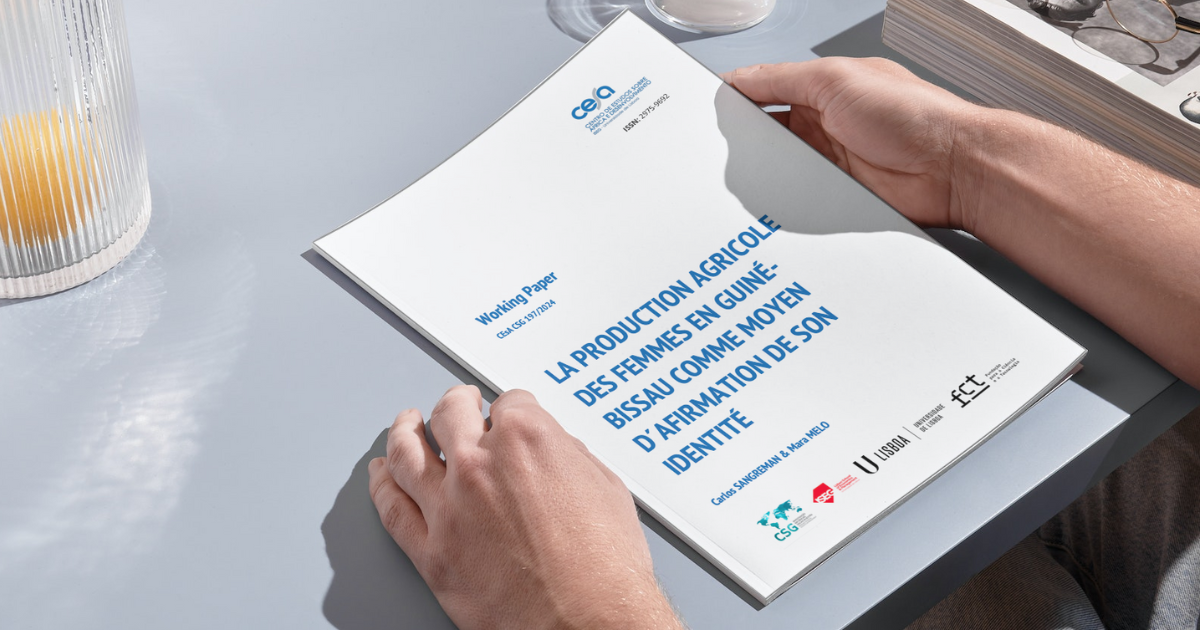
Working Paper CEsA no. 197/2024 analyses the impact of work and income on the identity of women horticulturists in Guinea-Bissau
CEsA has published its firts Working Paper in 2024 (no 197/2024), entitled “La Production Agricole des Femmes en Guiné-Bissau comme Moyen d´Afirmation de son Identité”, in French, authored by Carlos Sangreman and Mara Melo. Sangreman is President of the CEsA Assembly, is a CESA researcher, assistant professor of the Universidade de Aveiro (Portugal), and consultant for Guinea-Bissau at the Institute of Hygiene and Tropical Medicine in Portugal and Casa dos Direitos in Bissau. Melo holds a master’s degree from the University of Coimbra and the Institut d’ Études Polítques de Bordeaux.
This Working Paper is an intermediate product of the study carried out for Swiss Cooperation in Guinea-Bissau. Surveys and interviews were carried out in the regions of Bissau, Biombo, Bafatá and Oio, in the areas of production of leguminous agricultural products, by producers (mostly women). The focus of the analysis is on the practice of horticulture with the income belonging to women: “it influences the economic factor through the production and sales activity, it influences cultural factors because it is the woman who makes the key decisions for the activity and not the man and fights against family discrimination because women take on responsibilities in the family and home that they otherwise would not be able to assume and, therefore, tend to have a greater voice in family decisions”.
Click here to access the Working Paper no 197/2024.
Abstract:
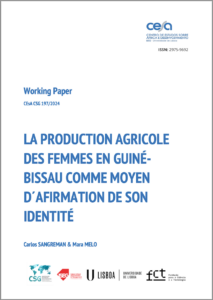 This working paper is an intermediate product of the study done for Swiss Cooperation in Guinea-Bissau, written in French without any point in Portuguese. What we demonstrate, as well as the principles of restitution and appropriation by the persons or institutions that access to respond to surveys or interviews, are words that do not translate into concrete actions for this Cooperation. The data were obtained by surveys and interviews in the regions of Bissau, Biombo, Bafatá, and Oio, with the producers (which also include a limited number of male producers) of leguminous agricultural products, in a sample of 160 people chosen at random. At the option of the promoter, the study focused on the marketing of products and not on production. To better understand the results, it must be said that this business model is not very profitable, but it is an activity that gives a greater independence of women in relation to men in the family space, since decisions about the use of profits belong to the producers. It also has a potential environment of action for the affirmation of the social (and not just family) identity of women that should not be despised although, as far as we can see, this is expressed for now only in the organization of associations of producers.
This working paper is an intermediate product of the study done for Swiss Cooperation in Guinea-Bissau, written in French without any point in Portuguese. What we demonstrate, as well as the principles of restitution and appropriation by the persons or institutions that access to respond to surveys or interviews, are words that do not translate into concrete actions for this Cooperation. The data were obtained by surveys and interviews in the regions of Bissau, Biombo, Bafatá, and Oio, with the producers (which also include a limited number of male producers) of leguminous agricultural products, in a sample of 160 people chosen at random. At the option of the promoter, the study focused on the marketing of products and not on production. To better understand the results, it must be said that this business model is not very profitable, but it is an activity that gives a greater independence of women in relation to men in the family space, since decisions about the use of profits belong to the producers. It also has a potential environment of action for the affirmation of the social (and not just family) identity of women that should not be despised although, as far as we can see, this is expressed for now only in the organization of associations of producers.
Click here and get to know all the Working Paper Collection of CEsA
Author: CEsA Communications (comunicacao@cesa.iseg.ulisboa.pt)
Images: CEsA/Reproduction
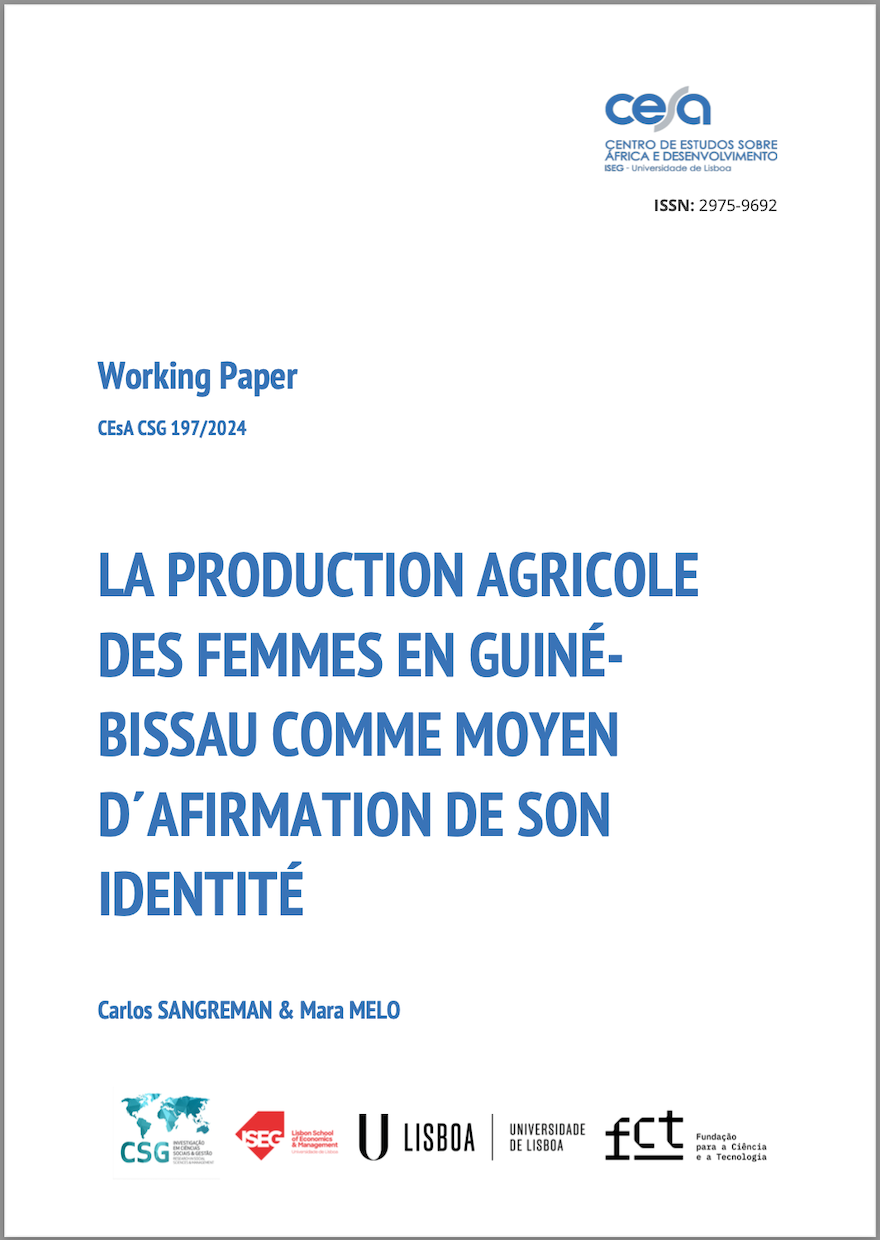
Working Paper 197/2024: La Production Agricole des Femmes en Guiné-Bissau comme Moyen d´Afirmation de son Identité
Abstract:
This working paper is an intermediate product of the study done for Swiss Cooperation in Guinea-Bissau, written in French without any point in Portuguese. What we demonstrate, as well as the principles of restitution and appropriation by the persons or institutions that access to respond to surveys or interviews, are words that do not translate into concrete actions for this Cooperation. The data were obtained by surveys and interviews in the regions of Bissau, Biombo, Bafatá, and Oio, with the producers (which also include a limited number of male producers) of leguminous agricultural products, in a sample of 160 people chosen at random. At the option of the promoter, the study focused on the marketing of products and not on production. To better understand the results, it must be said that this business model is not very profitable, but it is an activity that gives a greater independence of women in relation to men in the family space, since decisions about the use of profits belong to the producers. It also has a potential environment of action for the affirmation of the social (and not just family) identity of women that should not be despised although, as far as we can see, this is expressed for now only in the organization of associations of producers.
Cite this Working Paper:
Sangreman, C. e Melo, M. (2024). “La Production Agricole Des Femmes En Guiné-Bissau Comme Moyen D´Afirmation De Son Identité”. Instituto Superior de Economia e Gestão – CEsA/CGS – Documentos de trabalho nº 197/2024

Development Studies Seminars will kick off on February 29 at ISEG with a series of 10 sessions of presentations by guest researchers
The Centre for African and Development Studies (CEsA/CSG/ISEG/ULisboa) and the coordination of the Masters in Development and International Cooperation (MDCI) and the PhD in Development Studies (PDED) Programmes at ISEG – Lisbon School of Economics and Management, Universidade de Lisboa (ULisboa), invite you to the Development Studies Seminars 2024 — a series of 10 sessions of presentations given by guest researchers that encourage reflection on various topics in the field of Development Studies.
Seminars will take place from February 29 to May 30, 2024, on Thursdays*, from 6 pm to 8 pm, in Novo Banco Room**, at ISEG (Rua do Quelhas 6, Anfiteatro 23, Francesinhas 1, 1200-781, Lisbon, Portugal).
*The session on March 5, 2024 will exceptionally be on a Tuesday.
**The session on March 5, 2024 will take place in Room 006-F1 at ISEG. The session on May 9, 2024 will take place in Auditorium 2 at Quelhas, at ISEG.
Sessions will be presented in Portuguese or English (check the programme below), in a face-to-face format and with free admission. We recommend prior registration, but the capacity of the room will be filled in order of arrival.
The seminars are an initiative that, since 1991, promotes research carried out in the areas of study of MDCI/ISEG/ULisboa and PDED/ISEG/ULisboa.
Development Studies Seminars 2024
From February 29 to May 30 2024, on Thursdays*, from 6 pm to 8 pm.
Face-to-face event in Novo Banco Room**, ISEG (Rua do Quelhas 6, Anfiteatro 23, Francesinhas 1, 1200-781, Lisboa, Portugal)
*The session on March 5, 2024 will exceptionally be on a Tuesday.
**The session on March 5, 2024 will take place in Room 006-F1 at ISEG. The session on May 9, 2024 will take place in Auditorium 2 at Quelhas, at ISEG.
Click to download the programme:
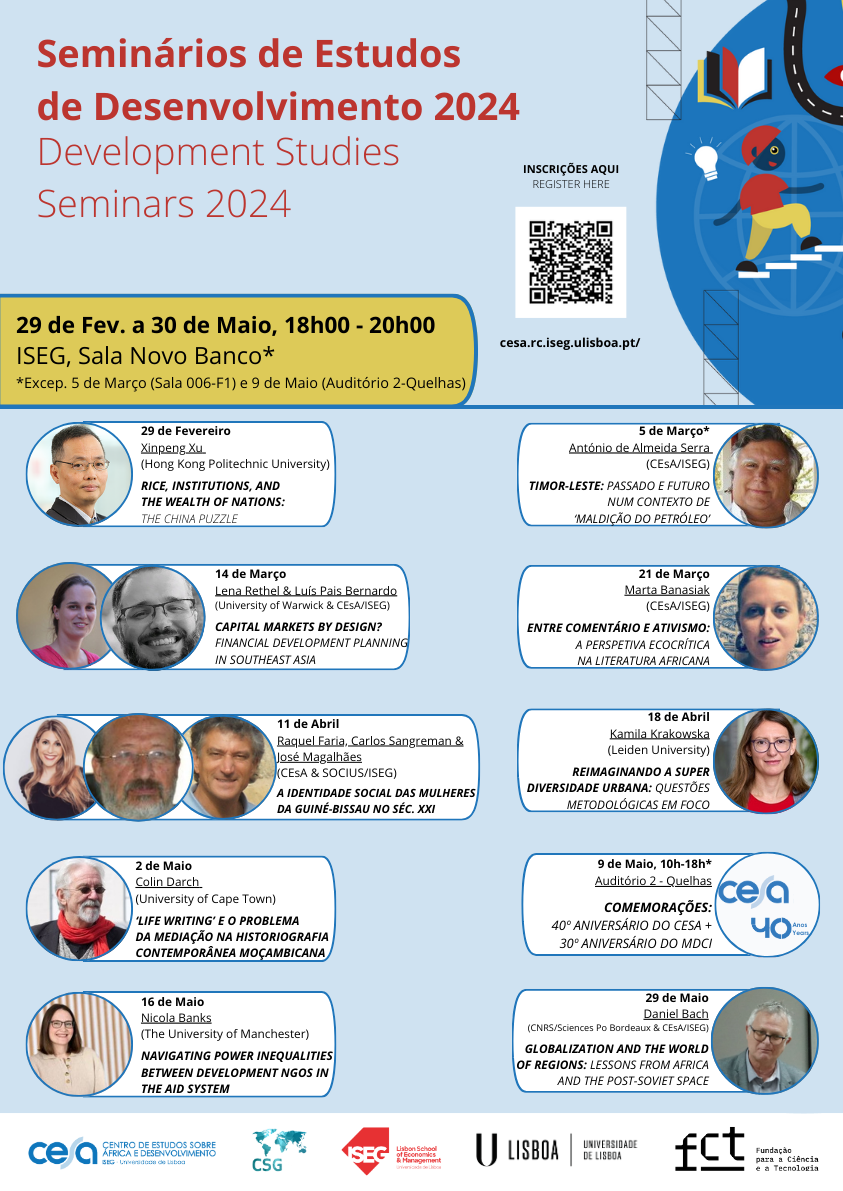
Author: CEsA Communication (comunicacao@cesa.iseg.ulisboa.pt)
Images: CEsA/Reproduction
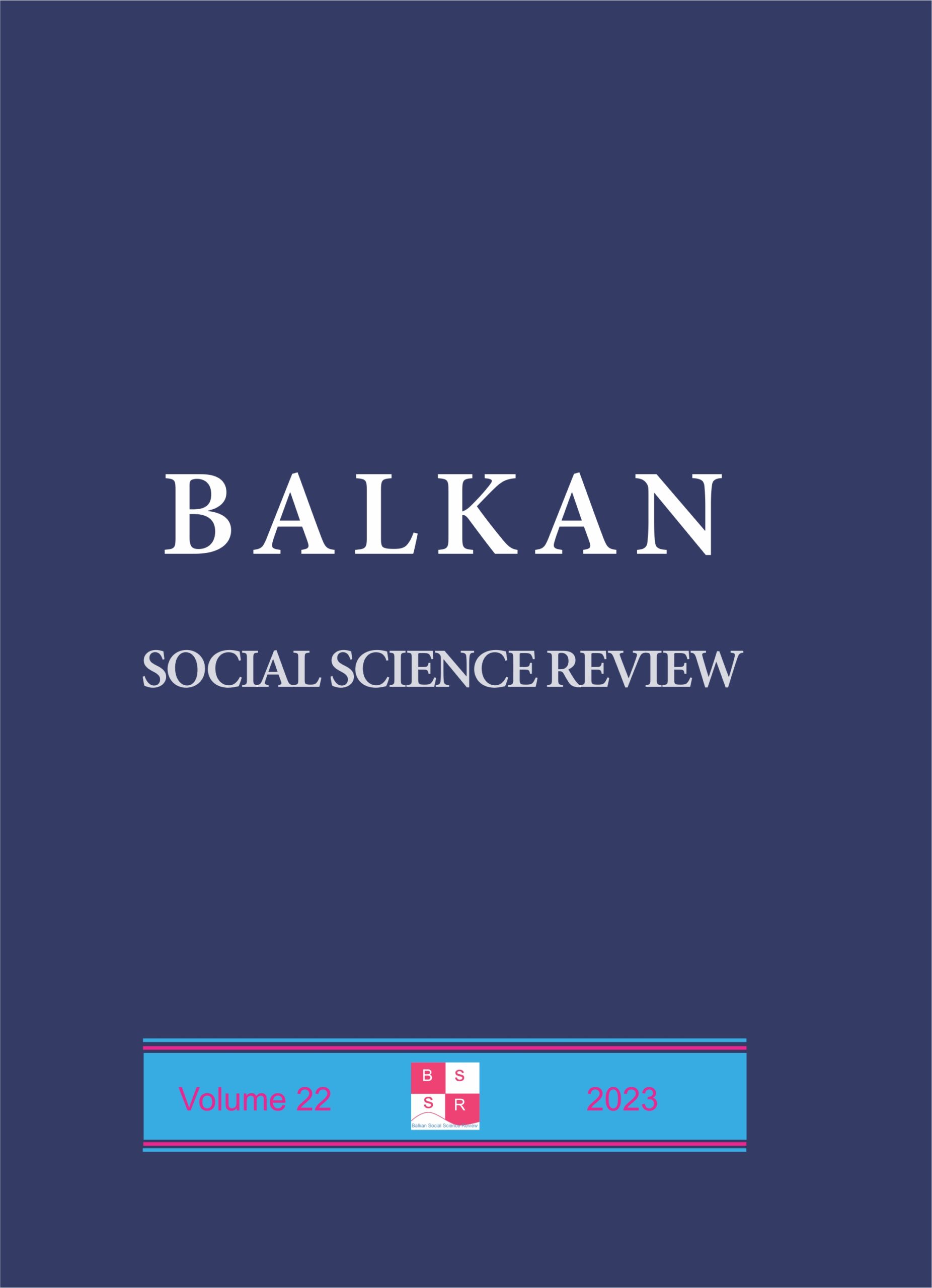
Understanding Social Realities of Internally Displaced Persons (IDPs) in the Federal Capital Territory of Nigeria (FCT), Abuja
Abstract:
This article examines the social realities of forcibly displaced persons in Nigeria, with a focus on internally displaced persons (IDPs) in the Federal Capital Territory (FCT) of Nigeria, Abuja. Internally displaced persons are individuals who have been forced from their homes or habitual places of residence and, unlike refugees, have not crossed the borders of their country. They remain under the primary protection of their governments and often seek refuge in their own countries. This study draws on secondary data sources and primary data collected from two IDPs campsites, arguing that most IDPs in the FCT, displaced by the Boko Haram insurgency live in makeshift and inhumane informal settlements in the peri-urban areas of Abuja City. These settlements also host the urban poor and other economic migrants in the country’s capital, occasionally leading to conflicts between them. The paper calls for the government to recognise the presence and condition of IDPs in the FCT and to work with relevant organisations to provide durable solutions to ensure that displaced persons can once again become productive members of society.
Cite this article:
BA-ANA-ITENEBE, C. A.; EDO, Z. O. (2023). Understanding Social Realities of Internally Displaced Persons (IDPs) in the Federal Capital Territory of Nigeria (FCT), Abuja. In: Balkan Social Science Review, Vol. 22, 213-231. https://doi.org/10.46763/BSSR232222213bai
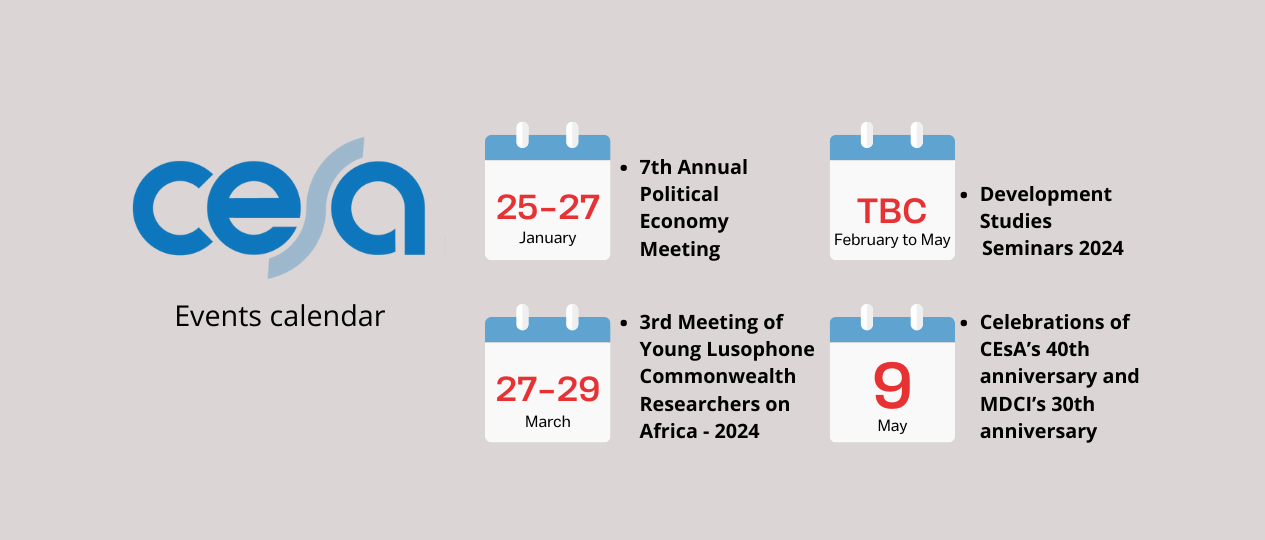
CEsA events calendar for 2024
Take a look at CEsA – Centre for African and Development Studies (CSG/ISEG/ULisboa) events calendar for 2024.
